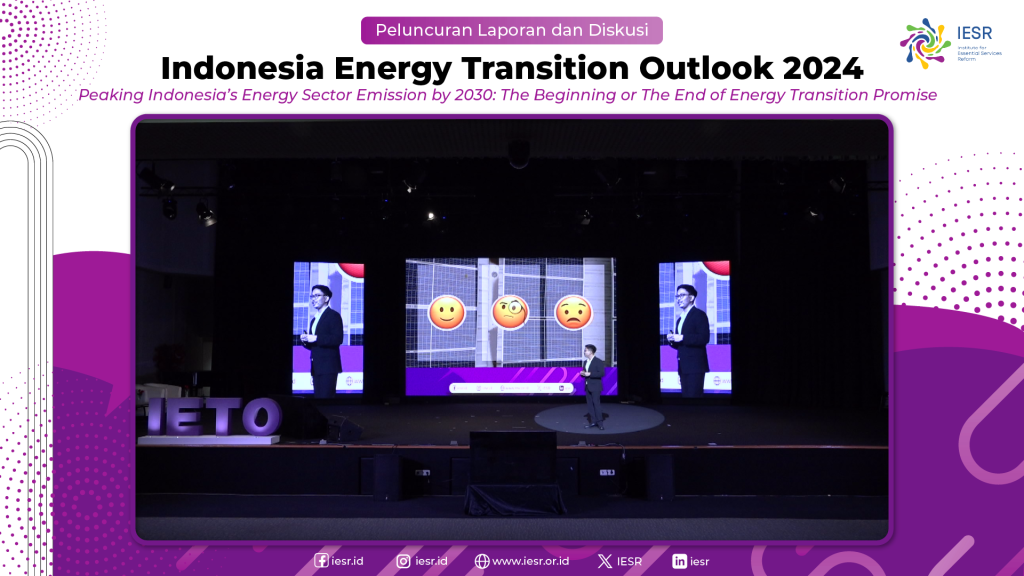Jakarta – In the next few weeks, Indonesia will officially have new leaders with the inauguration of President-elect Prabowo Subianto and Vice President Gibran Rakabuming Raka on Sunday, October 20, 2024. As Prabowo and Gibran become Indonesia’s President and Vice President for the 2024-2029 period, hopes for an energy transition have been raised.
The world, including Indonesia, is in a period of climate crisis. Based on the Intergovernmental Panel on Climate Change (IPCC) calculations, the Earth’s average temperature has reached 1.1 degrees Celsius, close to the 1.5 degrees Celsius threshold set in the Paris Agreement. If the Earth’s temperature exceeds this limit, the risk of natural disasters due to climate change will be more intense and detrimental. For this reason, efforts to end dependence on fossil energy, such as coal, need to be made by encouraging the use of renewable energy.
Unfortunately, the dominance of fossil energy is still entrenched in Indonesia. According to a Ministry of Energy and Mineral Resources (ESDM) report, the coal mix is still the highest in Indonesia’s primary energy mix, reaching 40.46 per cent in 2023, followed by petroleum at 30.18 per cent. The use of coal has significant negative impacts on the environment, such as high greenhouse gas emissions and air pollution. Therefore, shifting to renewable energy such as solar, wind, and hydropower should be a priority to reduce adverse environmental impacts.
His Muhammad Bintang, Research Coordinator for Energy and Power Resources at the Institute for Essential Services Reform (IESR), stated that Indonesia has a total technical potential of 7.9 TW of solar, wind, hydro, and biomass energy and 7.3 TWh for pumped hydro energy storage (PHES). Unfortunately, this huge potential has not been fully utilised.
“Therefore, the government under the leadership of Prabowo Subianto needs to increase its ambition in accelerating renewable energy to achieve the Net Zero Emissions (NZE) target of 2060 or earlier. Indonesia must also demonstrate stronger and more consistent political will, especially in facilitating investment needs. The President also needs to directly orchestrate an effective energy transition with comprehensive policies and encourage innovation, research and development of renewable energy technology,” said Bintang.

Bintang also highlighted two major challenges in accelerating renewable energy amid the dominance of coal. First is Indonesia’s dependence on coal as a source of electricity. Second, the economic dependence of coal-producing regions on the sector. An IESR study titled “Just Transition in Indonesia’s Coal Producing Regions, Case Studies Paser and Muara Enim” found that coal revenue sharing funds (DBH) accounted for 20 per cent of the total revenue budget of the Regency Government of Muara Enim, South Sumatra in 2023 and 27 per cent of the total revenue of the Paser Regency Government, East Kalimantan, in 2013-2020. However, this economic contribution is not significant to the income of coal industry workers.
“Reflecting on these conditions, the energy transition must be accompanied by the government’s readiness to encourage economic transformation in coal-producing areas. Post-mining economic transformation planning needs to prioritise economic activities that have multiple effects on local communities. In addition, the transformation of electricity infrastructure must be more compatible with utilising renewable energy,” Bintang added.
In their vision and mission, Prabowo and Gibran have initiated a discourse to push Indonesia towards energy self-sufficiency. However, this step must be accompanied by high transparency, especially in managing the biodiesel program to tackle emissions. According to an IESR study in the report “Indonesia Energy Transition Outlook (IETO) 2024,” Indonesia is the third largest biofuel producer globally, reaching 174,000 BOE/day in 2022. Bintang stated that while biodiesel, bioethanol, and bioavtur have been developed, emissions transparency is still in question. Hence, the effectiveness of biodiesel programs in climate mitigation needs to be evaluated.
IESR’s analysis found that placing biodiesel as an alternative fuel should also consider the environmental, social, and economic aspects of the palm oil industry’s plantations and supply chain. In addition, biodiesel’s expensive production and refining process is an obstacle if provided without subsidies, coupled with technical limitations in its utilisation as an alternative fuel.
The Indonesia Energy Transition Dialogue (IETD) 2024, which will take place on November 4-6, 2024, can be an important moment to discuss the direction of Indonesia’s energy transition policy. The theme of IETD 2024 is “Realising a Just and Directed Energy Transition.” The public can register at ietd.info to get involved in the IETD 2024 event.
This article was published as part of a media partnership between tanahair.net and the Institute for Essential Services Reform (IESR).














